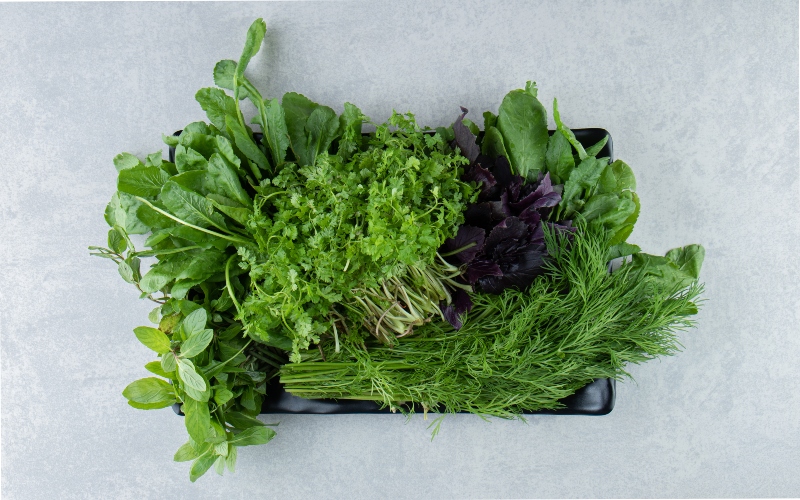How to keep fresh herbs alive and flavourful for longer

The first rule of herb care is knowing your category. Woody herbs, like thyme, rosemary, and oregano, have firm stems and tough leaves, making them naturally more resilient.
Fresh herbs have the power to elevate even the simplest dish into something unforgettable.
A sprig of rosemary on roasted potatoes, a handful of parsley over grilled fish, or a scattering of coriander across a bowl of soup can transform flavours from ordinary to extraordinary. Yet, as many home cooks know, these delicate greens tend to wilt and lose their fragrance far too quickly once brought home.
More To Read
- How to make a healthy Caesar salad at home with these simple steps
- Ngaremara mothers rely on goat and cow blood to prevent postpartum haemorrhage
- Parliament moves to regulate, integrate herbal medicine under proposed KEMRI Bill
- How to make yummy fried vegetable rice at home
- Easy Scotch eggs recipe to try over the weekend
- Vegetable intake low in Kenya amid growing health concerns
The secret lies in recognising that herbs are living plants, not static ingredients. Their structure, water content, and oil composition vary depending on whether they are woody or tender, and that’s precisely why proper storage makes all the difference.
1. Separate herbs by type
The first rule of herb care is knowing your category. Woody herbs, like thyme, rosemary, and oregano, have firm stems and tough leaves, making them naturally more resilient. Tender herbs, such as parsley, coriander, basil, and mint, are softer and more fragile, prone to bruising and wilting.
Because their moisture needs differ, storing them together accelerates spoilage. Separating them ensures each group is kept in optimal conditions for freshness and longevity.
2. Treat tender herbs like cut flowers
For soft-stemmed herbs like parsley, mint, or coriander, hydration is key. Trim the stems and place them upright in a clean glass or jar with a small amount of water, just as you would with fresh flowers.
Cover loosely with a plastic bag to create a gentle humidity dome, then refrigerate. Change the water every couple of days to prevent bacterial growth and keep the herbs vibrant.
“Think of your herbs as something alive, not a garnish to be forgotten in the fridge,” says Chef Mohamoud of Tribe Hotel. “They breathe, they absorb moisture, and they respond to how you treat them. Give them the right environment and they’ll last beautifully.”
3. Keep woody herbs cool and slightly moist
Woody herbs tolerate drier conditions. Wrap them gently in a slightly damp paper towel, then place them inside an airtight container or resealable plastic bag. Store in the fridge, ideally in the crisper drawer.
Avoid excess moisture, which can lead to mould or sliminess. With this method, rosemary and thyme can stay fresh for up to two weeks, sometimes longer.
4. Handle herbs gently
One common mistake is handling herbs too roughly. Crushing or overhandling releases essential oils prematurely, affecting flavour and accelerating decay.
Use your fingers rather than knives to separate leaves, and avoid pressing herbs tightly together in containers. Let them breathe; crowding traps moisture and invites spoilage.
5. Freeze herbs for long-term storage
If you’ve stocked up after a market visit or harvest, freezing herbs can preserve their flavour for months. Chop finely, place into an ice cube tray, and cover each cube with olive oil or water before freezing.
Once solid, transfer to a freezer-safe bag. When cooking, drop a cube into your pan or sauce; the herbs will defrost and release their oils, enriching your dish instantly.
This method works especially well for parsley, dill, coriander, and chives.
6. Never refrigerate basil
Basil is an exception. It dislikes the cold; refrigeration turns its delicate leaves black and brittle.
Instead, keep basil at room temperature in a glass of water, stems submerged, away from direct sunlight. You can loosely cover it with a plastic bag to reduce wilting, but never seal it completely. Under these conditions, basil can stay vibrant for several days.
7. Avoid washing until ready to use
While it may seem logical to wash herbs immediately, moisture is their greatest enemy. Washing too early introduces water that seeps into the leaves, hastening decay.
Wait until just before cooking to rinse. Use cold water, then gently pat dry with a clean towel or use a salad spinner. Dry herbs stay fresh longer and cook better, too.
Top Stories Today












































